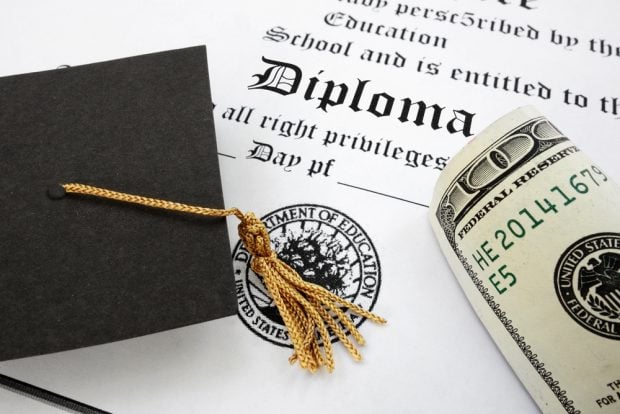 Graduating with a degree and debt. (Source: Shutterstock)
Graduating with a degree and debt. (Source: Shutterstock)
In the U.S., a college degree has usually meant financial security. But increased competition and overwhelming student debt are making that outcome less of a given.
That has spurred a feeling among many graduates that the qualification wasn't worth the time, effort or money.
Recommended For You
The brewing anxiety may burst into the open during the 2020 U.S. election campaign, when student finances are likely to be a key issue for Democrats. Among the party's presidential contenders, Senator Elizabeth Warren is promoting a plan that would make tuition free at all public colleges and universities, an idea also backed by Senator Bernie Sanders. Legislation on those lines has been introduced in the Senate and House, and has support from 2020 candidates Kamala Harris, Cory Booker and Kirsten Gillibrand.
Wage Premium
In recent years, more Americans have completed college degrees — lowering their rarity in the workplace, and eroding the wage premium they can command.
Americans with a bachelor's degree earned less in real terms last year than in 1990, according to New York Fed data. That's likely contributed to one of the findings from the Federal Reserve Board's sixth annual survey of household economics: Just two-thirds of those graduates believe their investment in education paid off.
The Fed data shows that a degree still makes an important contribution to financial stability. Adults with a bachelor's degree or higher are more likely to be on solid footing, with 87% saying they're doing at least OK financially. That compares with only 64% of those with a high school education or less.
Sentiment also splits by age: About 8 in 10 boomer-aged adults say that the benefits of their bachelor's degree outweighed the costs, while only about half of respondents under the age of 30 — a generation when degrees were more widespread — feel the same.
Of course, it depends on what you studied — and at what kind of school. Two-thirds of those with bachelor's degrees from public and private not-for-profit schools see benefits higher than costs, versus just half who attended for-profit institutions.
There are also disparities by race. The Fed survey found increasing levels of financial stability among whites and Hispanics with a college degree. That wasn't the case for black Americans: 61% with a high school degree or less say they're financially stable, and that reading remains the same once they attend college. For whites, though, there's an 8-point increase in financial stability — and it's a 14 point gain for Hispanics.
Once out of college, the differences between racial groups narrow, with 89% of white Americans saying they're doing OK money-wise, compared with 81% for Hispanics and 80% for blacks.
High costs are still keeping people out of higher education.
"Financial considerations, including costs being too expensive or a need to earn money, are the most common reasons" cited by two-thirds of young adults who didn't attend college and 62% who didn't complete their degree, the Fed found. With the benefit of hindsight, 1 in 9 would have chosen not to attend college.
A separate survey by MidAmerica Nazarene University offers a glimpse inside the student mind, finding that more than one-third of college seniors and recent graduates wished they had gone to a different school — because of high costs, or lack of fulfillment from their courses.
One-quarter said they didn't pursue the major they desired due to pressure from family or friends, while even more felt that the field they wanted to pursue would be too difficult.
Paying It Back
The Fed's household survey had plenty to say about debt, and how it weighs on students and their families. Here are some key findings.
- About 6% of adults have incurred debt to pay for a child's or grandchild's education. Most do it via standard student loans, but some 15% use credit cards and slightly more than 1 in 10 take out home equity loans.
- Nearly 3 in 10 adults with outstanding education debt are not currently required to make payments on their loans.
- Among those with outstanding student loans from their own education, 2 in 10 are behind on their payments.
- Among those with $100,000 of debt or more, 16% are behind.
- More than one-fifth of borrowers who went to private for-profit institutions are behind on payments.
© 2025 ALM Global, LLC, All Rights Reserved. Request academic re-use from www.copyright.com. All other uses, submit a request to [email protected]. For more information visit Asset & Logo Licensing.






